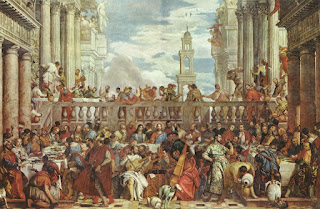 She had watched the tree closely after her last conversation with the snake. The birds and other animals sought the fruit of the tree—often there were no ripe ones left. They did not die.
She had watched the tree closely after her last conversation with the snake. The birds and other animals sought the fruit of the tree—often there were no ripe ones left. They did not die.And the tree was beautiful, not just the forbidden fruit—how could it kill? The woman and Adam carefully avoided the fruit because of the Lord God's prohibition—but now with the prospect of wisdom she found herself drawn to it.
Life was pleasant. There was food, companionship and love with Adam, beauty to admire, and work. The days flowed easily and probably endlessly had it not been for the others.
The Lord God visited the garden often—mostly it was easy to be with him. But when he commanded, nothing else existed. She was attracted to him—in a different way than Adam. When she looked into his eyes she saw the moonless sky.
The snake was different. He wasn't like the Lord God—his eyes held slashes of darkness. She was surprised when he first spoke—none of the other creatures knew words. Even more surprising, he didn't agree with what the Lord God had said—how could that be? He talked about the tree and how its fruit would make her like the Lord God. More than anything she wanted that. As far as good and evil went, they were just names—she didn't care about them, but to be like the Lord God was a hunger that the snake kindled and it grew within her.
Adam stood by the tree with his wife. They had talked about the fruit and what the snake had said, and he was also drawn to the tree. Death was a scary thing, but they decided they needed wisdom. The woman reached out, plucked, and took a bite. She didn't die. She paused, and gave him the fruit. The commandment of the Lord God came back to him and he hesitated.
Adam looked into her eyes and he was alone again. How could he bear that? He took a bite.
















